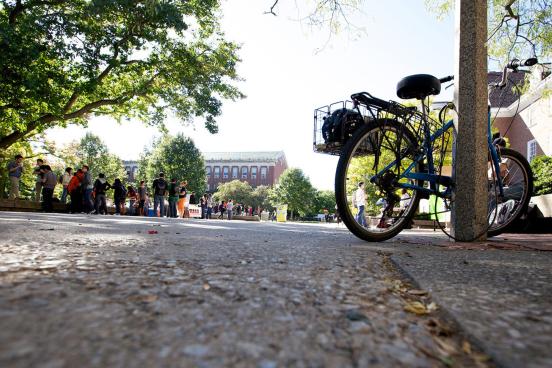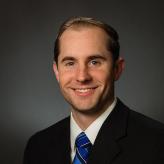Univ. of Wisconsin restricts student expression in public outdoor areas of campus
River Falls campus forbids student conversation without advance permission, student group recognition

RIVER FALLS, Wis. – Alliance Defending Freedom sent a letter Tuesday to officials with University of Wisconsin–River Falls on behalf of a student after a school administrator informed her that she could not engage in expression in the public outdoor areas of campus without paying for a reservation or registering as a student club. The letter explains that the university’s policies are vague and unconstitutional and, to avoid litigation, the school should permit students to exercise their First Amendment rights without unwarranted restraints.
On Sept. 6, 2019, freshman Sofie Salmon walked around UW–River Falls’s campus to recruit members to start a conservative club on campus. Accompanied by a couple of friends, she rolled an oversized beach ball—a “free speech ball”—along with her so that fellow students could express themselves by writing messages on it. Even though Salmon did not block any sidewalks, hinder instruction, or disrupt the campus educational environment, a school administrator told Salmon she must reserve a space for her expression, limit her speech to a public sidewalk on the edge of campus, or risk an encounter with campus police.
“The only permission slip students need to speak on public college campuses is the U.S. Constitution,” said ADF Legal Counsel Caleb Dalton. “The First Amendment doesn’t allow a university or college to play favorites or limit free speech to so-called ‘speech zones.’ The current University of Wisconsin–River Falls policies are unconstitutional because they force students to ask permission before speaking and allow school administrators to silence student speech based on viewpoint or other vague, arbitrary reasons.”
After her encounter with the university administrator, Salmon emailed the administrator to ask about the policies to gain clarity about her rights and she attempted to locate the speech policies on the university’s website. Despite multiple emails, she received no direct response to her questions regarding her right to speak outdoors or what policies she allegedly violated. ADF attorneys representing Salmon located the policies they think the administrator was referring to but noted they “were not easily accessible by students through typical search terms.” In addition, upon examination, the policies are vague and unconstitutional when applied to Salmon, ADF attorneys say.
“Here, the University treats individual students that are not part of a registered club the same as if they were not members of the university community,” the ADF letter explains. “Indeed, far from recognizing the public areas of campus as a public forum or even a designated public forum for students, UW–River Falls policies apparently forbid individual students from engaging in any expression or distribution of literature unless it is pre-approved and the speakers are assigned a specific location. Furthermore, the University’s policies restrict the content of expression, prohibit anonymous speech, prohibit spontaneous speech, and grant unbridled discretion to administrators who may approve or disapprove of the speech based on its content or viewpoint. Each restriction violates the First Amendment.”
The ADF letter asks the university for a written response—no later than Feb. 24—identifying the policy used to prohibit Salmon from speaking and agreeing to revise the outdoor facility use policies to ensure that administrators do not prohibit students from speaking spontaneously in public outdoor areas.
On Sept. 6, 2019, freshman Sofie Salmon walked around UW–River Falls’s campus to recruit members to start a conservative club on campus. Accompanied by a couple of friends, she rolled an oversized beach ball—a “free speech ball”—along with her so that fellow students could express themselves by writing messages on it. Even though Salmon did not block any sidewalks, hinder instruction, or disrupt the campus educational environment, a school administrator told Salmon she must reserve a space for her expression, limit her speech to a public sidewalk on the edge of campus, or risk an encounter with campus police.
“The only permission slip students need to speak on public college campuses is the U.S. Constitution,” said ADF Legal Counsel Caleb Dalton. “The First Amendment doesn’t allow a university or college to play favorites or limit free speech to so-called ‘speech zones.’ The current University of Wisconsin–River Falls policies are unconstitutional because they force students to ask permission before speaking and allow school administrators to silence student speech based on viewpoint or other vague, arbitrary reasons.”
After her encounter with the university administrator, Salmon emailed the administrator to ask about the policies to gain clarity about her rights and she attempted to locate the speech policies on the university’s website. Despite multiple emails, she received no direct response to her questions regarding her right to speak outdoors or what policies she allegedly violated. ADF attorneys representing Salmon located the policies they think the administrator was referring to but noted they “were not easily accessible by students through typical search terms.” In addition, upon examination, the policies are vague and unconstitutional when applied to Salmon, ADF attorneys say.
“Here, the University treats individual students that are not part of a registered club the same as if they were not members of the university community,” the ADF letter explains. “Indeed, far from recognizing the public areas of campus as a public forum or even a designated public forum for students, UW–River Falls policies apparently forbid individual students from engaging in any expression or distribution of literature unless it is pre-approved and the speakers are assigned a specific location. Furthermore, the University’s policies restrict the content of expression, prohibit anonymous speech, prohibit spontaneous speech, and grant unbridled discretion to administrators who may approve or disapprove of the speech based on its content or viewpoint. Each restriction violates the First Amendment.”
The ADF letter asks the university for a written response—no later than Feb. 24—identifying the policy used to prohibit Salmon from speaking and agreeing to revise the outdoor facility use policies to ensure that administrators do not prohibit students from speaking spontaneously in public outdoor areas.
The ADF Center for Academic Freedom is dedicated to ensuring freedom of speech and association for students and faculty so that everyone can freely participate in the marketplace of ideas without fear of government censorship.
# # # | Ref. 70921
Related Profiles
Image

Caleb Dalton
Senior Counsel
Caleb Dalton serves as senior counsel with Alliance Defending Freedom’s Center for Life, where he brings over a decade of civil rights litigation and public advocacy experience to the team, securing the rights of the unborn and those who advocate for them.
